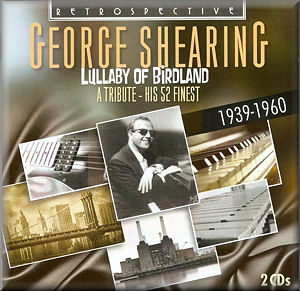CD1
1 Lullaby Of Birdland
2 Stomp In F
3 Squeezin’ The Blues
4 The Sheik Of Araby
5 Missouri Scrambler
6 Dinah
7 Delayed Action
8 Jump For Joy
9 Champagne
10 More Than You Know
11 Rosetta
12 A Ghost Of A Chance
13 Five Flat Flurry
14 Trunk Call
15 It’s Easy To Remember
16 Have You Met Miss Jones?
17 Bop’s Your Uncle
18 Consternation
19 Poinciana
20 Cherokee
21 Bebop’s Fables
22 Sorry, Wrong Rhumba
23 Moon Over Miami
24 The Continental
25 Summertime
26 September In The Rain
CD2
1 East Of The Sun
2 Conception
3 I Didn’t Know What Time It Was
4 I’ll Remember April
5 Jumpin’ With Symphony Sid
6 Little White Lies
7 Roses Of Picardy
8 Pick Yourself Up
9 I’ll Be Around
10 Taking A Chance On Love (With Billy Eckstine)
11 How High The Moon?
12 Love Is Just Around The Corner
13 Mambo Inn
14 The Folks Who Live On The Hill
15 If I Should Lose You
16 Stella By Starlight
17 If
18 Serenata
19 Sand In My Shoes
20 Mambo No.2
21 Moonlight Becomes You
22 Do I Love You, Do I? (With Peggy Lee)
23 Isn’t It Romantic?
24 Always True To You In My Fashion (With Peggy Lee)
25 Satin Doll
26 The Nearness Of You (With Nancy Wilson)
George Shearing (piano, and accordion) with quintet and other groups
Rec. 1939-60 [78:38 + 77:28]
It wasn’t long after the death of George Shearing in 2010 that
Retrospective marked
his passing with this handy twofer. One reason for its success is
the attention paid to
Early Shearing; the 78 sides he made in his native London between
1939 and 1948,
of which there are 16 here. By a quirk of history, the first Shearing
performance I
heard was not the famous locked hands quintet sides, but the much
earlier Jump for
Joy, a straight-ahead Boogie recorded in wartime London. It was
anthologised on a
Best of British Jazz LP by Ace of Clubs in the 60s which is where
I heard it one rainy
Saturday when I was 14, and then wandered off into the realm of Shearing
as a result.
His 1939 tune Stomp in F is really a paraphrase of Honeysuckle
Rose, in which
he unveils his Boogie patterns again, and on the following track,
Squeezin’ the
Blues shows off his accordion licks – he was an accomplished
practitioner of this
misunderstood instrument – accompanied by another soon-to-become
expatriate,
Leonard Feather. It’s enjoyable to hear Hatchett’s Swingtette
in action in 1940,
because whilst their recordings have certainly had attention paid
to them, a single
example shows their virtues – Stephane Grappelli’s violin,
Shearing, the strong
guitar team of Jack Llewellyn and Chappie D’Amato – as well
as its limitations,
here centred on multi-instrumentalist Stanley Matthews’s woodenly
on-the-beat
clarinet playing. It’s good to hear Dinah where Shearing,
Grappelli, Llewellyn and
drummer Dave Fullerton forge a good unity; Django Reinhardt had returned
to
Paris, and Grappelli stayed in London throughout the war. Champagne
is played
by Harry Parry and the Radio Rhythm Club Sextet; remove Parry’s
klezmer-and
Goodman-inspired clarinet and you have the famous quintet format Shearing
was
soon to utilise in his ‘sound’. Missouri Scrambler
shows Shearing unfettered by
anyone else, even Carlo Krahmer, whose competent, but unnecessary,
drumming can
be heard elsewhere. Shearing had a taste for classical music and his
tastes included
impressionism and Delius, a love he shared with Mel Tormé with
whom he made
many successful albums years later. Something of that infuses Delayed
Action.
Shearing’s indebtedness to Teddy Wilson is nowhere more evident
than in More Than
You Know, though there are also percussive ‘front line’
Earl Hines influences at work
too. Before we leave the English period it’s well worth listening
to Shearing’s own
1944 Sextet; trumpeter Kenny Baker, alto player Harry Hayes, tenor
Aubrey Franks,
bassist Tommy Bromley and Kramer on the drums. This swinging small
group with
jump band proclivities is simply outstanding. It sounds American,
with no rhythmic
slackness or instrumental shilly-shallying.
By 1949 Shearing was in America and daring some complex harmonic
journeys – try
Summertime – and his quintet was in the fresh bloom of
its popularity. These sides
are all part of the Shearing canon and justifiably famed. But one
should always note
the way that, in successive quintets, Shearing, wearing his Teddy
Buckner locked-
hands style with pride, infiltrated bluesy licks and Latino time
signatures into the mix.
Debussy too wasn’t far away as Stella by Starlight, from
1956, shows graphically.
If is the famous old ballad, which Shearing proudly imported to his
new found
land, though rather less happily he also imported Beethoven’s
Moonlight Sonata
into Moonlight Becomes You – wherein we must acknowledge
the pianist’s famous
predilection for puns and associative by-play. Shearing was never
solemn though he
could be serious, and could unfurl a filigree right hand with great
beauty of tone; try
The Folks Who Live On The Hill with Billy May’s orchestra.
This two disc set takes us up to 1960 and a track with singer Nancy
Wilson. Shearing
had a real affinity for accompanying singers, but that’s another
story. This story, a
two disc story, has been well told by Retrospective, and if you haven’t
got Proper’s 4
disc box then this twofer makes a plausible smaller cousin for your
shelves.
Jonathan Woolf
See also review by Tony Augarde
